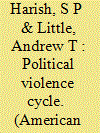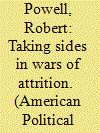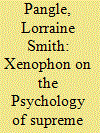|
|
|
Sort Order |
|
|
|
Items / Page
|
|
|
|
|
|
|
| Srl | Item |
| 1 |
ID:
153780


|
|
|
|
|
| Summary/Abstract |
We present, test, and extend a theoretical framework that connects disgust, a powerful basic human emotion, to political attitudes through psychological mechanisms designed to protect humans from disease. These mechanisms work outside of conscious awareness, and in modern environments, they can motivate individuals to avoid intergroup contact by opposing immigration. We report a meta-analysis of previous tests in the psychological sciences and conduct, for the first time, a series of tests in nationally representative samples collected in the United States and Denmark that integrate the role of disgust and the behavioral immune system into established models of emotional processing and political attitude formation. In doing so, we offer an explanation for why peaceful integration and interaction between ethnic majority and minorities is so hard to achieve.
|
|
|
|
|
|
|
|
|
|
|
|
|
|
|
|
| 2 |
ID:
153779


|
|
|
|
|
| Summary/Abstract |
We study the impact of naturalization on the long-term social integration of immigrants into the host country society. Despite ongoing debates about citizenship policy, we lack reliable evidence that isolates the causal effect of naturalization from the nonrandom selection into naturalization. We exploit the quasi-random assignment of citizenship in Swiss municipalities that used referendums to decide on naturalization applications of immigrants. Comparing otherwise similar immigrants who narrowly won or lost their naturalization referendums, we find that receiving Swiss citizenship strongly improved long-term social integration. We also find that the integration returns to naturalization are larger for more marginalized immigrant groups and when naturalization occurs earlier, rather than later in the residency period. Overall, our findings support the policy paradigm arguing that naturalization is a catalyst for improving the social integration of immigrants rather than merely the crown on the completed integration process.
|
|
|
|
|
|
|
|
|
|
|
|
|
|
|
|
| 3 |
ID:
153784


|
|
|
|
|
| Summary/Abstract |
Studies of property rights overwhelmingly focus on whether states expropriate or protect property, overlooking the crucial issue of whether private sector actors will use state institutions. By contrast, I argue that the “supply” of formal legal institutions often fails to ensure firms will rely on the state for property rights protection. Instead, firms frequently avoid formal legal institutions and turn to illegal strategies based on violence or corruption. Whether firms adopt legal strategies depends on: (1) firm-level practices and beliefs that impede the use of law, (2) the effectiveness of illegal strategies, and (3) coordination problems resulting from firms’ expectations about each other’s strategies. Drawing on interviews with firms, lawyers, and private security agencies, as well as an original survey of Russian enterprises, I illustrate how “demand-side” factors led to a surprising increase in Russian firms’ reliance on formal legal institutions over the past two decades. The findings suggest that comprehensive understanding of property rights and the rule of law requires not only attention to state institutions’ effectiveness, but also to private actors’ strategies.
|
|
|
|
|
|
|
|
|
|
|
|
|
|
|
|
| 4 |
ID:
153788


|
|
|
|
|
| Summary/Abstract |
The U.S. Constitution is best understood not as a “social contract,” but as a popularly issued corporate charter. The earliest American colonies were literal corporations of the Crown and, like all corporations, were ruled by limited governments established by their charters. From this, Americans derived their understanding of what a constitution is—the written charter of a sovereign that ordains and limits a government. The key Federalist innovation was to substitute the People for the King as the chartering sovereign. This effectively transferred the “governance technology” of the corporation to the civil government—including the practice of delegating authority via a written charter, charter amendment, and judicial review. Federalists used these corporate practices to frame a government that united seeming irreconcilables—a government energetic yet limited, republican yet mixed, popular yet antipopulist—yielding a corporate solution to the problem of arbitrary rule. Leading founders considered this new government a literal chartered corporation of the People.
|
|
|
|
|
|
|
|
|
|
|
|
|
|
|
|
| 5 |
ID:
153785


|
|
|
|
|
| Summary/Abstract |
Individual-level studies of electoral turnout and vote choice have focused largely on personal attributes as explanatory variables. We argue that scholars should also consider the social network in which individuals are embedded, which may influence voting through variation in individuals’ social proximity to elites. Our analysis rests on newly discovered historical records revealing the individual votes of all electors in the 1859 statewide elections in Alexandria, Virginia and the 1874 municipal elections in Newport, Kentucky, paired with archival work identifying the social relations of the cities’ populations. We also replicate our core findings using survey data from a modern municipal election. We show that individuals more socially proximate to elites turn out at a higher rate and individuals more socially proximate to a given political party’s elites vote disproportionately for that party. These results suggest an overlooked social component of voting and provide a rare nineteenth-century test of modern voting theories.
|
|
|
|
|
|
|
|
|
|
|
|
|
|
|
|
| 6 |
ID:
153778


|
|
|
|
|
| Summary/Abstract |
Elections are often violent affairs, casting doubt on the canonical claim that democracy makes societies more peaceful by creating nonviolent means to contest for power. We develop a formal argument to demonstrate that this conclusion is incorrect. Holding elections has a direct effect of increasing levels of violence close to the voting, as this is when electoral violence can influence political outcomes. Precisely for this reason, elections also have an indirect effect of decreasing levels of violence at all other times, as parties can wait for the election when their efforts are more likely to succeed. The direct and indirect effects generate a “political violence cycle” that peaks at the election. However, when the indirect effect is larger, politics would be more violent without elections. When elections also provide an effective nonviolent means to contest for power, they unambiguously make society more peaceful while still generating a political violence cycle.
|
|
|
|
|
|
|
|
|
|
|
|
|
|
|
|
| 7 |
ID:
153787


|
|
|
|
|
| Summary/Abstract |
Nudging policies rely on behavioral science to improve people's decisions through small changes in the environments within which people make choices. This article first seeks to rebut a prominent objection to this approach: furnishing governments with the power to nudge leads to relations of alien control, that is, relations in which some people can impose their will on others—a concern which resonates with republican, Kantian, and Rousseauvian theories of freedom and relational theories of autonomy. I respond that alien control can be avoided, if nudging is suitably transparent and democratically controlled. Moreover, such transparency and democratic control are institutionally feasible. Building on this response, I then provide a novel and surprising argument for more nudging: democratically controlled public policy nudging can often contain the power of private companies to nudge in uncontrolled and opaque ways. Therefore, reducing alien control often requires more rather than less nudging in public policy.
|
|
|
|
|
|
|
|
|
|
|
|
|
|
|
|
| 8 |
ID:
153786


|
|
|
|
|
| Summary/Abstract |
Who is responsible for protest mobilization? Models of disease and information diffusion suggest that those central to a social network (the core) should have a greater ability to mobilize others than those who are less well-connected. To the contrary, this article argues that those not central to a network (the periphery) can generate collective action, especially in the context of large-scale protests in authoritarian regimes. To show that those in the core of a social network have no effect on levels of protest, this article develops a dataset of daily protests across 16 countries in the Middle East and North Africa over 14 months from 2010 through 2011. It combines that dataset with geocoded, individual-level communication from the same period and measures the number of connections of each person. Those on the periphery are shown to be responsible for changing levels of protest, with some evidence suggesting that the core’s mobilization efforts lead to fewer protests. These results have implications for a wide range of social choices that rely on interdependent decision making.
|
|
|
|
|
|
|
|
|
|
|
|
|
|
|
|
| 9 |
ID:
153777


|
|
|
|
|
| Summary/Abstract |
Third parties often have a stake in the outcome of a conflict and can affect that outcome by taking sides. This article studies the factors that affect a third party's decision to take sides in a civil or interstate war by adding a third actor to a standard continuous-time war of attrition with two-sided asymmetric information. The third actor has preferences over which of the other two actors wins and for being on the winning side conditional on having taken sides. The third party also gets a flow payoff during the fighting which can be positive when fighting is profitable or negative when fighting is costly. The article makes four main contributions: First, it provides a formal framework for analyzing the effects of endogenous intervention on the duration and outcome of the conflict. Second, it identifies a “boomerang” effect that tends to make alignment decisions unpredictable and coalitions dynamically unstable. Third, it yields several clear comparative-static results. Finally, the formal analysis has implications for empirical efforts to estimate the effects of intervention, showing that there may be significant selection and identification issues.
|
|
|
|
|
|
|
|
|
|
|
|
|
|
|
|
| 10 |
ID:
153781


|
|
|
|
|
| Summary/Abstract |
Distrust of public authorities is a mainstay of democratic politics. In recent decades, however, concern with surging civic suspicion has led political scientists to emphasize the value of trust for good government. This article advances a novel reading of Jeremy Bentham's political theory to shed light on the promise and perils of these two dispositions. Trust and distrust go together, in Bentham's account. In making this case, I reexamine Bentham's reflections on publicity, and distinguish between two perspectives implicit in his theory—the perspective of institutional design, and the perspective of popular oversight. This distinction brings clarity to Bentham's surprising recommendation: sober distrust toward public authorities generally, together with particularized trust in those (and only those) institutions or officials who prove themselves worthy of it.
|
|
|
|
|
|
|
|
|
|
|
|
|
|
|
|
| 11 |
ID:
153783


|
|
|
|
|
| Summary/Abstract |
Under what conditions do individuals withdraw support from dominant parties in nondemocratic regimes? Employing an original panel survey, we measure the same individuals’ support for Russia's dominant party first at the peak of its dominance in 2008 and again shortly after it suffered a cascading defection of regime supporters in 2011–12. This allows us uniquely to explore the microfoundations of theories of regime defection cascades, generally supporting the argument that they involve complex “informational” as well as “reputational” processes. Accordingly, we find that early and eager movers in such a cascade tend to come from less socially vulnerable segments of the population, to have greater need to rely on other people for interpreting events, to believe the regime has lower levels of popular support, and to come from more heterogeneous communities. We find little role for mass media (including social media) or democratizing zeal in driving Russia's regime defection cascade.
|
|
|
|
|
|
|
|
|
|
|
|
|
|
|
|
| 12 |
ID:
153782


|
|
|
|
|
| Summary/Abstract |
This study illuminates Xenophon's teaching about the underlying psychological motives of the most fully developed political ambition. An analysis of what the Cyropaedia portrays as the interplay among Cyrus's spiritedness, justice, benevolence, piety, and cultivation of an aura of divinity leads to an unveiling of supreme ambition's deepest root: not the desire for power as such, nor the love of justice, but the desire to be a quasi-divine benefactor. The article traces the development of this ambition from its earliest manifestations in the young Cyrus's puppylike spiritedness, through his hope-filled rise to power, to his grim mature rein and his death, showing how a shadowy concern for immortality drives him in ways he is reluctant to see or acknowledge.
|
|
|
|
|
|
|
|
|
|
|
|
|
|
|
|
|
|
|
|
|